Tag: Harvard-Smithsonian Center for Astrophysics
-
Nation & World
The disciplines of dance
Harvard’s new director of the OFA Dance Program, Jill Johnson, brings a love of movement and a boundless curiosity to the post and a desire to connect her disciplines to a range of academic pursuits.
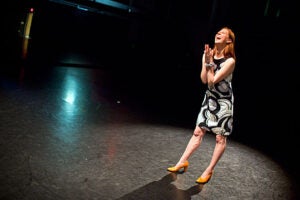
-
Nation & World
When old stars slow down
New research from the Harvard-Smithsonian Center for Astrophysics shows that some old stars might be held up by their rapid spins, and when they slow down, they explode as supernovae. Thousands of these “time bombs” could be scattered throughout our Galaxy.
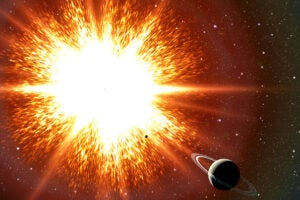
-
Nation & World
Alien world is blacker than coal
Imagine a giant world like Jupiter, but more alien than any planet in our solar system. Instead of displaying gleaming clouds colored white and salmon, this world is darker than the blackest lump of coal. It glows only with a feeble red light like a stove’s electric burner — the result of scorching heat from…
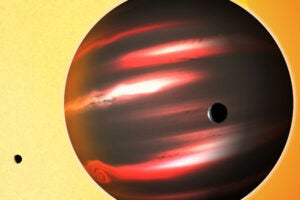
-
Nation & World
Light fantastic
New research shows that aurorae on distant “hot Jupiters” could be 100 to 1,000 times brighter than Earth’s aurorae. “I’d love to get a reservation on a tour to see these aurorae,” said lead author Ofer Cohen, a postdoctoral fellow at the Harvard-Smithsonian Center for Astrophysics.
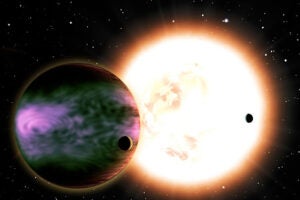
-
Nation & World
A supernova that’s super different
A researcher at the Harvard-Smithsonian Center for Astrophysics has uncovered a new way that stars end their lives, in a bright, fast explosion that appears different from the known characteristics of the stellar cataclysms called supernovas.
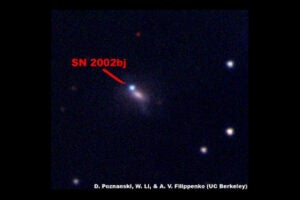
-
Nation & World
A fate in the stars
Astronomy Professor David Charbonneau is as enthusiastic about explaining his field to students as he is about researching faraway planets.
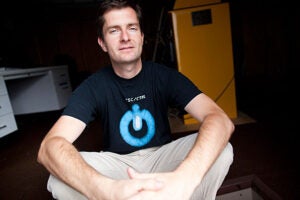
-
Nation & World
Harvard Club of Australia Foundation awards fellowships to three from Harvard
The Harvard Club of Australia Foundation has awarded fellowships to three distinguished Harvard researchers intending collaborative scientific research in Australia during 2011.
-
Nation & World
Astronomers honored for excellence, research
Harvard astronomers Robert P. Kirshner and Gaspar Bakos were honored this month (Jan.) by the American Astronomical Society.
-
Nation & World
Brian Marsden, astronomer and comet predictor, 73
Brian Marsden passed away on Nov. 18 after a prolonged illness at the age of 73. He was a supervisory astronomer at the Smithsonian Astrophysical Observatory and an associate of the Harvard-Smithsonian Center for Astrophysics.
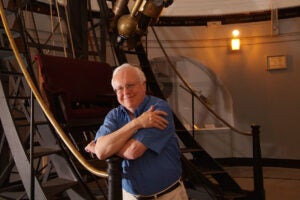
-
Nation & World
John Huchra, astronomer, dies at 61
John Peter Huchra died unexpectedly on Oct. 8 at the age of 61. He was the Robert O. & Holly Thomis Doyle Professor of Cosmology and the senior adviser to the provost for research policy at Harvard.
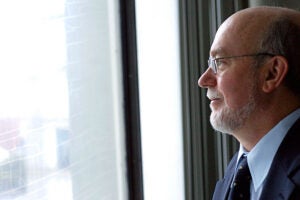
-
Nation & World
‘It is within our grasp’
Answers to questions about life in the universe is “within our grasp,” astronomer Lisa Kaltenegger said at an Origins of Life Initiative forum.
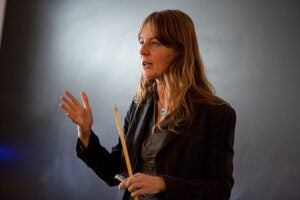
-
Nation & World
Forward, into the past
Harvard undergraduate Derek Robins recounts his summer spent doing astronomy research on campus.

-
Nation & World
Telescope Detects Possible Earth-Size Planet
Harvard researchers working with NASA’s Kepler satellite reported Thursday that they might have spotted a planet just 1.5 times the diameter of Earth around a Sun-like star 2,000 light-years away…
-
Nation & World
Hyperfast star was booted from Milky Way
A hundred million years ago, a triple-star system was traveling through the bustling center of our Milky Way galaxy when it made a life-changing misstep. The trio wandered too close to the galaxy’s giant black hole, which captured one of the stars and hurled the other two out of the Milky Way.
-
Nation & World
A Sultry World Is Found Orbiting a Distant Star
Astronomers said Wednesday that they had discovered a planet composed mostly of water.
-
Nation & World
CfA shows schoolchildren the stars
The Harvard-Smithsonian Center for Astrophysics is giving middle school children in three Massachusetts towns a taste of astronomy, using robotic telescopes they control themselves to fuel their interest in careers in science, technology, engineering, and math.
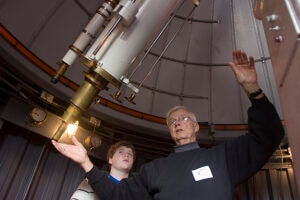
-
Nation & World
Darrel B. Hoff dies at 76
Darrel B. Hoff, 76, who taught at the Harvard-Smithsonian Center for Astrophysics for six years, died on Nov. 2 at the Winneshiek Medical Center in Decorah, Iowa.
-
Nation & World
Findings on Mysterious Haze at Galaxy’s Center
In the latest episode of their continuing efforts to embrace and understand the dark side of creation, astronomers sifting data from a new satellite say they have discerned the existence of a mysterious haze of high-energy particles surrounding the center of the Milky Way galaxy… “Obviously we wouldn’t be doing this if we didn’t think…
-
Nation & World
Invisible matters
A new study seeking to answer the question of why some galaxies are extremely dark compared with others may eventually help to explain the formation of all galaxies, according to…
-
Nation & World
Around the Schools: Faculty of Arts and Sciences
Astronomers at the Harvard-Smithsonian Center for Astrophysics discovered a record-breaking gamma-ray burst located 13 billion light-years from Earth.
-
Nation & World
Visitors will gravitate to ‘Black Holes’ exhibit
On Sunday, June 21, a new exhibit developed by educators and scientists at the Harvard-Smithsonian Center for Astrophysics (CfA) will open at the Boston Museum of Science. Called “Black Holes:…
-
Nation & World
Peculiar, junior-sized supernova discovered by New York teen
In November 2008, Caroline Moore, a 14-year-old student from upstate New York, discovered a supernova in a nearby galaxy, making her the youngest person ever to do so.
-
Nation & World
Transit search finds super-Neptune
Astronomers at the Harvard-Smithsonian Center for Astrophysics havediscovered a planet somewhat larger and more massive than Neptuneorbiting a star 120 light-years from Earth. While Neptune has a diameter3.8 times that…
-
Nation & World
Milky Way bigger, faster than previously thought
Our own Milky Way galaxy, long considered a “little sister” to the larger Andromeda Galaxy, is all grown-up, according to new research presented today that shows the Milky Way to be bigger and faster than previously thought.
-
Nation & World
New visualization techniques yield star formation insights
New computer visualization technology developed by the Harvard Initiative in Innovative Computing has helped astrophysicists understand that gravity plays a larger role than previously thought in deep space’s vast, star-forming…
-
Nation & World
Strong evidence brown dwarfs form like stars
Astronomers have uncovered strong evidence that brown dwarfs form like stars. Using the Smithsonian’s Submillimeter Array (SMA), they detected molecules of carbon monoxide shooting outward from the object known as…
-
Nation & World
Solar system’s young twin has two asteroid belts
Astronomers have discovered that the nearby star Epsilon Eridani has two rocky asteroid belts and an outer icy ring, making it a triple-ring system. The inner asteroid belt is a…
-
Nation & World
Laser precision added to search for new Earths
Harvard scientists have unveiled a new laser-measuring device that they say will provide a critical advance in the resolution of current planet-finding techniques, making the discovery of Earth-sized planets possible.…
-
Nation & World
Solar evidence points to human causes of climate change
It’s getting harder and harder to blame the sun for causing the gradual increase in global temperatures that are now being seen in the climate record, scientists said today. In…


